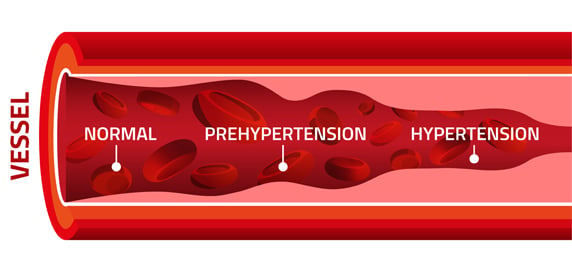What is Blood Pressure?
Blood pressure is the amount of force required to pump the blood in the arteries so that it can circulate through the body. A certain amount of blood pressure is vital to the life of cells as this is what pushes fluids carrying nutrients and oxygen to the cells. Blood pressure also helps ensure the elimination of waste materials from the cells out of the blood and into the urine as the blood passes through the kidneys. As a result, pressures that are too low or too high can cause medical problems. However, although low blood pressure causes tiredness and in some cases, mental depression, it is not life threatening. High blood pressure, in contrast, is far more serious and can be fatal.
Blood pressure is measured at two levels, that is why blood pressure readings always have two numbers. The upper number represents the pressure when the heart is contracting and is known as the systolic pressure, the lower number is the diastolic reading and represents the heart at rest between beats. Average blood pressure reading for normal persons is 120/80 mm Hg (millimetres of mercury). .
When the systolic pressure in an adult is 140 mm Hg or greater and the systolic pressure is 90 mm Hg or more blood pressure is considered to be high. High blood pressure is termed hypertension and directly increases the risk of arteriosclerosis (hardening of the arteries). Arteriosclerosis gives rise to coronary heart disease (ultimately heart attack) and to strokes (prevention of blood flow to parts of the brain). There are many risk factors associated with the development of arteriosclerosis.
What causes hypertension?
There is no known cause for hypertension but there are certain risk factors that are usually present in persons who have high blood pressure. These include:
- Heredity – people whose parents have high blood pressure are more likely to develop it.
- Gender – being male seems to put one at greater risk but many women do also develop it. Some women who are on oral contraceptives do develop hypertension and some that have never had it before develop it during pregnancy. These women as well as those who are over weight, have a family history of high blood pressure or have had a mild kidney disease are more likely to develop high blood pressure.
- Age – generally speaking as we age, we become more prone to developing high blood pressure.
- Sodium sensitivity – some persons’ cells are more sensitive to increases of sodium in the diet, which leads to developing hypertension when using high salt diets. Reducing salt intake in these persons may help to lower their blood pressure.
- Obesity and overweight – This has been shown to be a contributor to hypertension. The extra weight as well as the extra miles of capillaries that the blood has to be pushed through because of the extra adipose tissue (fat) present causes the pressure to become elevated.
- Heavy alcohol and cigarette consumption
- .
- Sedentary or inactive lifestyle.
- Use of certain types of medications– for example steroids, non-sterodial anti-inflammatory drugs, some nasal decongestants and cold remedies, appetite suppressants (diet pills).
How can hypertension be prevented?
Some of the risk factors mentioned cannot be changed but some are avoidable. Alcohol consumption, excessive use of sodium in the diet, being overweight or obese and leading an inactive lifestyle can all be changed
The American Heart Association has developed dietary guidelines for healthy adults to help prevent heart disease and its consequences. These include:
- Reduction of total fat intake to no more than 30 percent of daily/weekly total caloric intake.
- Decrease saturated fatty acid intake (from the harder type of fats, margarine and those usually from animal sources to no more than 8 to 10 percent of total daily/weekly calories. Increase polyunsaturated fatty acids intake (from vegetable oils and fatty fish) to 10 percent of total daily/weekly calories.
- Adjust monounsaturated fatty acids (found in certain types of oils such as olive) to 15 percent of total calories.
- Cholesterol intake should be less than 300 milligrams per day.
- Sodium intake should be less than 2400 milligrams, about 1 ¼ teaspoon of salt per day.
- Carbohydrate intake should make up 55 – 60 percent of calories, with emphasis on increasing complex carbohydrate sources (ground provisions, whole grain cereals etc.).
- Total calories should be adjusted to achieve and maintain a healthy body weight. Excess body weight should be lost.
- A regular exercise programme for those leading a sedentary lifestyle is also very important.
The emphasis on fats and the different types of fats in the diet is not only to reduce overweight but also to help prevent atherosclerosis. This develops when the arteries have cholesterol plaques deposited in them and soon become hard and inelastic, and unable to carry the quantity of blood in them that is required. This also causes blood pressure to build up. Atherosclerosis develops from young adulthood because of diet high in fats (mainly cholesterol) but it takes decades before the clinical disease manifests itself.
Can it be treated?
Hypertension cannot be cured but it can be treated and controlled to prevent enlarged and damaged heart cells, stroke or kidney failure, all of which can be fatal. The degree of success of treatment depends to a large extent on the patient following the advice of the doctor and dietitian. If medication has been prescribed it must be taken each day even on days when one feels well. Diet changes must also be adhered to in order to help keep the blood pressure close to normal. Weight loss and exercise may also be advised and these can only happen if the patient follows the advice given.
Choosing a diet moderate in salt and sodium by:
- Gradually reducing the amount of salt and cooking butter in recipes.
- Eating more fresh fruit & vegetables as snacks.
- Season and cook with more lime or vinegar and fresh herbs and seasonings such as chive, thyme, garlic, onion etc. Avoid seasoning salts, powders and cubes, and items to which vet sin (MSG) has been added.
- Prepare items such as rice, potatoes, vegetables and pasta without adding salt to the cooking water.
- Using smaller amounts of condiments such as ketchup, mustard and salad dressings.
- Avoiding too many salted foods in one week – corned beef, salt fish, smoked herring, pig’s or beef tails.
- Choosing lightly salted or unsalted type snacks in preference to the salted varieties.

